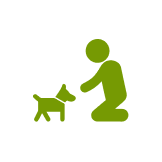In 24 cities
Why Your Cat’s Digestive Health Deserves More Attention
|
|
Time to read 2 min
Enter pincode
Please enter a valid pincode Enter the pincode to check delivery date
Enter the pincode to check delivery date
100% Authentic

Easy return policy

Help us ensure a smooth delivery
SIZE GUIDE
Written by: Dr. Shantanu Kalambi
|
|
Time to read 2 min
Cats are often seen as low-maintenance when it comes to food—but their digestive health is far more sensitive and central to overall wellness than most pet parents realize. From how nutrients are absorbed to how they behave and feel, a cat’s gut health influences much more than just their appetite.
If your cat has been experiencing frequent hairballs, irregular litter box usage, or occasional vomiting, these may be signs that their digestive system needs support.
Your cat’s digestive tract isn’t just a food-processing system—it’s a critical player in overall health. It impacts:
Nutrient absorption – ensuring your cat gets the protein, vitamins, and minerals from food
Immune function – a significant portion of a cat’s immune system resides in the gut
Energy regulation – healthy digestion supports consistent, balanced energy throughout the day
Skin and coat health – proper digestion can reduce flakiness and dullness in the coat
Most cats won’t express discomfort openly, so it’s important to watch for:
Irregular or difficult bowel movements
Frequent vomiting or spitting up after meals
Poor appetite or pickiness
Lethargy or lack of interest in daily activities
Dull, flaky coat despite regular grooming
If these symptoms persist, consult your vet—but also consider evaluating your cat’s current diet.
Many digestive problems can be addressed by selecting food that supports gut function. Here’s what to look for:
Animal-based proteins : Cats are obligate carnivores and digest animal protein more efficiently than plant-based ingredients.
Digestive fibre : Small amounts of fibre (like pumpkin or beet pulp) help regulate bowel movements and reduce hairballs.
Probiotics and prebiotics : These promote healthy gut bacteria and strengthen immunity.
Low-allergen or limited-ingredient diets : These reduce the risk of food intolerances in cats with sensitive stomachs.
A diet tailored to your cat’s life stage and health profile is essential—what works for an indoor senior cat may not suit a young, active kitten.
Supplements can complement a balanced diet, especially for cats with:
Food transition
Recent antibiotic use
Mild chronic digestive discomfort
Options include:
Probiotics to support gut flora
Digestive enzymes to assist in breaking down food
Soluble fibres to improve stool quality
Speak to your vet or SuperCompanion to find the right option and dosage for your cat.
Digestive health is not just about preventing stomach upsets—it’s a foundation for your cat’s energy, immunity, skin health, and long-term wellbeing. Being proactive with their nutrition can help prevent common issues and support a more comfortable, happy life.



In 24 cities

Happy pet parents

For every new member

Exclusive
2 item in cart
₹10,360


